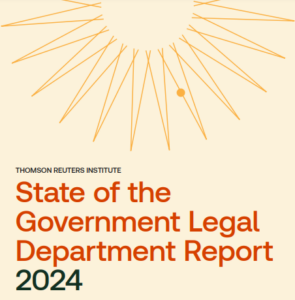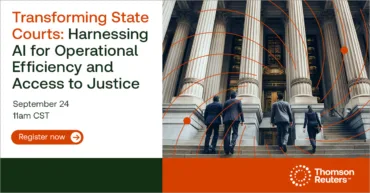Government legal professionals are among the most confident members of the legal industry today. A huge majority of government lawyers—86%—describe their departments as being successful.
But that’s a far cry from these lawyers saying they have no frustrations with their current operations or that they have few concerns about their department’s future. They have plenty.
In particular, government lawyers are focusing on specific areas—talent and efficiency issues, above all—that a more adept use of technology could alleviate. The question is how to get to that next level. How to find the best technological solutions to streamline operations and free lawyers from being bogged down in administrative tasks at the expense of value-added client services.
The Thomson Reuters Institute’s State of the Government Legal Department Report 2024 finds that of the 150 respondents surveyed earlier this year, most described their departments as having a good reputation and having high levels of client satisfaction and work/life balance. But there are notable areas of discontent.
 |
There’s a broad sense of inefficiency, for example. Nearly two-thirds (65%) of respondents said their departments have yet to determine how to address a lack of internal efficiency, and 58% said that staff spend too much time on administrative tasks.
This leads into another area of concern for government legal practices: talent. When asked to name major challenges facing their department, surveyed lawyers put talent-related issues first. About 59% of respondents said that attracting and retaining top talent can be challenging. Roughly 52% said recruiting new talent was an issue, and 55% said they feared a loss of institutional knowledge due to retiring staff.
Inefficiency and talent shortages reinforce each other. Junior lawyer burnout is a fundamental problem for many law practices, with government firms being no exception. The more that a legal department endures sub-par operations, and the more time that associates in particular are stuck doing time-consuming paperwork, the more likely that a firm will be plagued by valued employee attrition or could struggle to make new quality hires.
Working through strategic frustrations
In particular, there’s a deep sense of frustration among government lawyers about what they perceive as inadequate operations within their departments, as well as insufficient methods of keeping abreast of legal and regulatory changes.
Lawyers surveyed said they spend too much time on administrative tasks, and not enough time on actual legal practice (47%). They find it difficult to keep up with emerging legal issues (37%) and being apprised of changes to existing law (37%). A majority (54%) said they don’t have enough time to thoroughly conduct research on new/complex issues.
Taken in full, the survey findings show that government legal departments could greatly benefit from the use of next-generation technologies, particularly those that incorporate generative AI programs.
Well over a quarter of respondents (35%) believe that their department struggles to adopt and implement new technologies.
Government legal professionals say the biggest hurdles to achieving greater tech adoption include:
Budget
About 76% of respondents said budget constraints affect tech rollouts and usage. Because government legal budgets are affected by factors that don’t typically apply to private companies—such as elected officials deciding to cut department budgets or mandated budget caps—this presents a unique challenge for government legal departments.
Bureaucracy
Another factor often heightened by the nature of government legal work. About 53% of respondents said having to deal with bureaucratic approvals is hindering tech adoption. Respondents also said government legal employees are resistant to change (27%) and that there’s often difficulty in changing processes (38%).
Lack of specialization
Half (50%) of respondents said that there are too few tech solutions that are specifically designed for government legal use. And nearly 60% said their department’s technology was either below or far below that of the private sector.
How government legal departments can leverage technology
The survey does indicate some hopeful developments in government legal adoption of new technology—a near-majority (45%) of respondents said their department has upped its tech investment in the past two years, up from the 39% that said this in the Thomson Reuters Institute’s previous government legal survey, done in 2022.
Government legal departments use technology in a few long-established areas. Take online legal research, which almost every single respondent said their firm employs. Remote work technologies, electronic signatures, and document management are other solutions that a vast majority of government legal teams have in place.
For next-generation tech like GenAI, however, it’s a different story. Here the view of government legal officials diverges sharply from their private sector counterparts. Where 63% of respondents from corporate legal departments either use GenAI or were planning or considering adopting it, only 29% of government lawyers surveyed said so. The overall sentiment among government lawyers about GenAI is a firm “neutral” (47%) or 38% pessimistic/”apocalyptic.” Only 15% say they are optimistic.

But solutions like HighQ offer a way for government legal departments to embrace new technology, presenting users with next-generation solutions that seamlessly incorporate GenAI into their day-to-day practices, maximizing productivity.
Next-generation technology is essentially designed to allay the survey respondents’ top concerns. Take inefficiency, for example. Attorneys getting buried under piles of documents is a thing of the past. Progressive tech solutions will establish a central hub for attorneys, in which matter intake gets automated and streamlined, as well as case and document management. Here GenAI enhances various data management operations, whether it’s via summarizing/annotating documents or creating more adaptable scheduling. Tasks that now take an attorney weeks to complete can be done in a day, or even hours.
The potential is transformative for legal departments. In an internal ROI survey from 2023 to 2024, 83% of users agreed that HighQ reduces administrative time. Almost all (98%) said they felt they had achieved greater efficiency in terms of exchanging and locating documents and 88% said HighQ had freed up time for them to focus on more valuable tasks.
The need to move forward
In many ways, government legal professionals are the envy of the legal sector. Government lawyers are confident about their department’s reputation, believe they have a good life/work balance, and feel that employee satisfaction is high. But these may be tenuous gains if government legal departments don’t keep their eyes on the horizon and work to improve areas, particularly inefficiency, that could be a long-term drag on their operations.
Additional public investment—particularly on the technology front—may be what’s needed for government legal departments to better handle their myriad duties. The public sector greatly falling behind the private one, in terms of using next-generation technology, would be a bad outcome for government legal teams and the many people and industries who depend on them and their work.
 |













